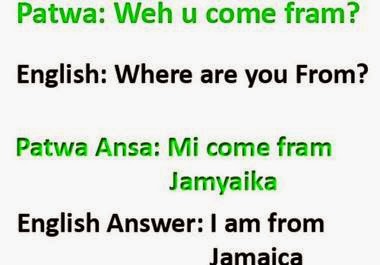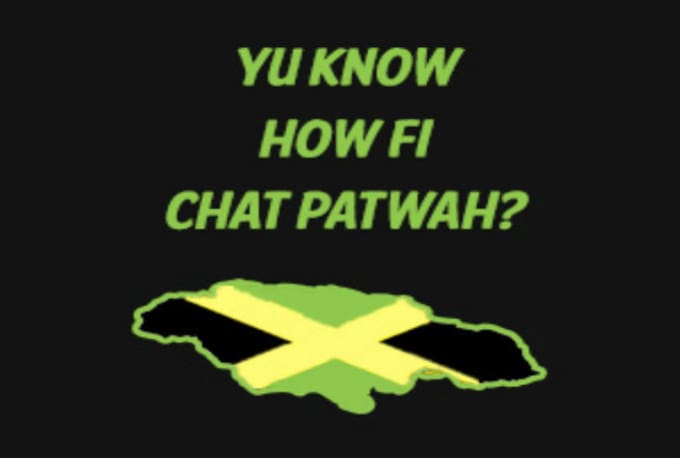
The literal translation would be ‘In the tomorrows’ meaning ‘see you later’. Jamaican Patois has the same 5 vowels youre familiar with. For example Weh yuh a seh? Mi deh try call yuh means ‘How are you doing? ‘Inna di morrows’ Used when saying goodbye. Vowel sounds are the foundation of pronunciation in any language. ‘Weh yuh ah seh’ Literally translated as ‘what are you saying’ but actually meaning ‘how are you doing’. Island time is much slower than the rest of the world and this expression should be interpreted as meaning anything from a few hours to a few days. However if you’re told mi soon come don’t be fooled. ‘Mi Soon Come’ This Jamaican expression means literally I’ll be right there. Jamaican people waiting for the bus | © Gabi Luka/Shutterstock. › caribbean › jamaica15 Jamaican Patois Phrases To Know | Culture Trip › caribbean › jamaica Cached‘Small up yuhself’ A useful expression to know when using crowded buses or taxis Small up yuhself quite literally means to make some room.

If you think about it, some of us are actually tri-lingual! And we switch from one to the other without thinking, as the circumstances dictate.15 Jamaican Patois Phrases To Know | Culture Trip 15 Jamaican Patois Phrases To Know | Culture Trip Most speak patois, or a combination of patois and Jamaican English. I Will Be Right Back Mi Soon Come To Eat Nyam Jamaica Jamrock, Jamdown, Yard. Suffice it to say that not many people in Jamaica speak standard English. Below is a list of 18 Jamaican Patois phrases translated to English.

English to jamaican patois full#
I could go on and on, but this page isn't about to engage in a full blown language lesson. In the example below, both the "are" in the compound verb "are going" and the preposition "to" are left out.Įnglish: She is not here. "Mi a" is used to indicate an action that is taking place, replacing "I am". Patois: She trow di ball inna di bush/She did trow di ball inna di bush. Jam English: She throw/threw di ball into di bush. The word "did" may be added to the present tense of the verb to form the past tense.Įnglish: She threw the ball into the bush. Source: Sample video A video about Jamaican, which includes some Jamaican expressions and Jamaican poem. Patois: Jonathan pass di tes/Jonathan did pass di tes. Common usage ranges from Jamaican English to broad patois with about three degrees of separation, often within a single speaker's conversation. In patois, the article "a" is often replaced by "one"(wah).

Jamaican Patois: Courtney have wah new book/Courtney got wah new book. Jamaican Patois ( / ptw / locally rendered Patwah and called Jamaican Creole by linguists) is an English-based creole language with West African, Taino, Irish, Spanish, Hindi, Portuguese, Chinese and German influences, spoken primarily in Jamaica and among the Jamaican diaspora. Jam English: Courtney have a new book/Courtney has a new book.Ī plural verb may or may not be used with a singular subject. Sometimes the phrases will be the same, but often they are quite different. Maybe the best way to explain is by using examples - the same phrase expressed in English, Jamaican English and Jamaican Patois. Patois words and phrases are often included, but usually in ways which would not stop the standard English speaker from understanding what is being said. It uses mostly English words, but the grammar,construction and the pronunciation are often different from those used in standard English. A majority of non-English loan words are of Akan Ashanti origin. Jamaican Patois, known locally as Patois (Patwa or Patwah) and called Jamaican Creole by linguists, is an English-based creole language with West African influences. If I were to place Jamaican English on the continuum between Jamaican patois and standard English, it would probably be closer to the standard English side. Tue, Jamaican Creole (Language), an article Jamaican Creole is celebrated on this date in 1692. Well, it's not Standard English, which is what I try to use when I write, for the most part. Despite persisting efforts by Jamaican linguists to enhance the de jure status of Jamaican Creole, English remains the sole official language of Jamaica. I've been told by my daughter that I better qualify what I mean by Jamaican English, as there are definitions which are used by scholars, and she doesn't want her mother looking ignorant all over the internet.

Now that I've said that, I'm now beginning to think that maybe patois is the default. But when we are excited, upset or agitated, we rely more on Jamaican patios to express ourselves. It's what we use between family members under normal circumstances. I think of Jamaican English as the default setting in my household.


 0 kommentar(er)
0 kommentar(er)
